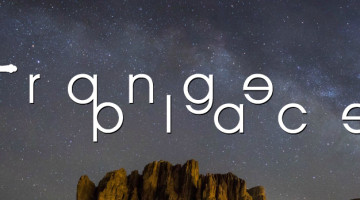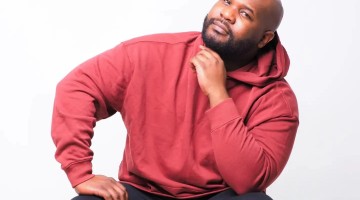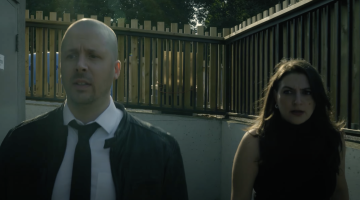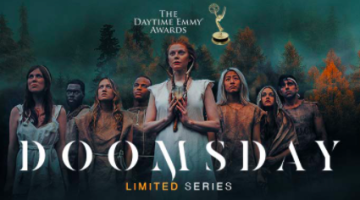For those who’ve just gotten out of college and who find that the job market is either spotty or just plain empty, it can be a real struggle to make ends meet. For four young post-grads who make their home in a Chicago apartment complex, that’s not the only thing they have to deal with – because they’re all superheroes.
Having debuted in 2009, the action/adventure web series PLATOON OF POWER SQUADRON focuses on a disparate group of strangers who find that although it’s difficult for them to make a steady living, their newly found superpowers provide plenty of opportunities for success. That is, if they’re willing to use them.
The ongoing series, created by and co-starring Jake Jarvi, airs on both its official web site and Youtube page. While PLATOON OF POWER SQUADRON has had a consistent presence since ’09, Jarvi says that the exact amount of episodes depends on how one chooses to watch them through those platforms. Nonetheless, it’s a customizable experience for viewers who either don’t have a lot of time to watch, or for those who are able to spend extended time viewing each episode. “It depends on how you define episodes. Episodes, as I call them, run between 22 minutes and our last one was 48 minutes. There are 7 episodes, as I call them, but those are also broken up into smaller segments on Youtube. On our web site, you can watch them all in one go,” he says. Three more are soon to air in the ongoing series.
 PLATOON OF POWER SQUADRON stars Craig Benzine as Donald, a college graduate who decides that standing out all day in a sweaty, uncomfortable bear costume as a lowly paid mascot for a local taco joint is clearly beneath him. Seeking not only a more glamorous job but also one that will help save humanity, he decides to become the next great crime fighter.
PLATOON OF POWER SQUADRON stars Craig Benzine as Donald, a college graduate who decides that standing out all day in a sweaty, uncomfortable bear costume as a lowly paid mascot for a local taco joint is clearly beneath him. Seeking not only a more glamorous job but also one that will help save humanity, he decides to become the next great crime fighter.
From there, he teams up with Jonas (Jake Jarvi), whom Donald feels is uniquely qualified to help him on his quest to become a superhero based solely on the fact that he works in a comic book store. For Donald, it also helps that Jonas’ alter ego is the mind controlling Professor Synapse, and while he’s well aware that with his great power comes great responsibility, he’s far too reluctant to use said responsibility. Soon, Donald transforms into the incredible Mister Doctor Electricon, who uses the intense power of lightning to fend off his enemies.
The series’ ensemble cast also includes Carlyn Janus as Sebastian whose boring job at a bookstore quickly takes a back seat to her powerful alias as the multiplying and constantly changing heroine Madam Generator. In addition, Eliza Toser plays yarn store employee Virginia (a.k.a. The Princess of the Fourth Dimension), whose main superpowers include the ability to not only stop the ticking sands of time but to create portals that transcend the very boundaries of time itself. Donald, Jonas, Sebastian and Virginia band together to fight perhaps their greatest enemy – the villainous Damon (played by Derrick Henry Stout, who also serves as music composer).
While each of these working class superheroes possess extraordinary powers that are soon evident to all they encounter, Jarvi says the story of just how they got together – and especially how they gained their superhuman skills – is a mystery that unfolds throughout the series. “They all have these superpowers. So far, we don’t know how they ended up in an apartment together. We don’t know where they got their superpowers. We don’t know if it means anything that they have superpowers. They don’t know themselves.”
 For Jarvi, three of network TV’s most popular and acclaimed sci-fi series provided much of the inspiration for PLATOON OF POWER SQUADRON. “I’ve always done a lot of video production. I’ve always had various projects here and there. This time, I was watching a lot of SMALLVILLE. I was watching a lot of LOST. I wanted a superpower show but with normal people that had questions that weren’t answered. That’s kind of where the origins came about.”
For Jarvi, three of network TV’s most popular and acclaimed sci-fi series provided much of the inspiration for PLATOON OF POWER SQUADRON. “I’ve always done a lot of video production. I’ve always had various projects here and there. This time, I was watching a lot of SMALLVILLE. I was watching a lot of LOST. I wanted a superpower show but with normal people that had questions that weren’t answered. That’s kind of where the origins came about.”
For a time, though, it looked like the Platoon’s adventures would never get off the page. “We were about to start shooting the first episode when HEROES came on TV, and I was like, ‘well, HEROES is out.’ Then I watched HEROES, and they were doing something very different than what we were doing (within the sub-genre). Once you get into the sub-genre, you can start breaking into how things are. When you look at it, it’s normal people with superpowers, ‘okay, there’s the same thing’, but they took a very serious look at it. The characters all seemed very troubled, and they were also trying to save the world,” he says.
Even though Jarvi wasn’t the first to bring viewers a series about average people whose abilities make them different than everyone else, that didn’t mean he couldn’t explore the new possibilities for storytelling that shows like HEROES provided. While the popular NBC series brought viewers a darker, more dramatic view of ordinary people possessing extraordinary powers, PLATOON OF POWER SQUADRON takes a different approach to its portrayal of its characters and story. As a result, it’s a web series that’s not only true to the sub-genre found in shows like HEROES, but also one that’s more relatable to viewers.
“Our characters’ ambitions are much smaller than those things. I think it’s much more personal. I hesitate to say reality based because the first episode’s real goofy, but what we’ve turned into over the course of the show is trying to take a more everyday, realistic look at superpowers without it being about flights and tights, and all VFX all the time. Our VFX are pretty decent, but I think the selling point of the show is the relationships of the main four characters and how down to earth they seem as people,” Jarvi says.
 While Jarvi and his talented cast make the most of their abilities in front of the camera, they do an equally impressive job behind it. As a result, the process of producing each episode is not only a team effort but also one that brings out the various talents of Jarvi and his cast. “We’re a real kind of homespun series. Everybody does a lot of jobs on this thing. We’ve got a couple of people who just really dedicate a lot of time to it. Most of them are producers, as well as running sound and being the director of photography. Everybody wears a lot of hats on this show,” he says.
While Jarvi and his talented cast make the most of their abilities in front of the camera, they do an equally impressive job behind it. As a result, the process of producing each episode is not only a team effort but also one that brings out the various talents of Jarvi and his cast. “We’re a real kind of homespun series. Everybody does a lot of jobs on this thing. We’ve got a couple of people who just really dedicate a lot of time to it. Most of them are producers, as well as running sound and being the director of photography. Everybody wears a lot of hats on this show,” he says.
Although Jarvi, Toser, Janus and Benzine share producing credits, the responsibilities they share of bringing the adventures of the Platoon to life are incredibly varied. In addition to co-starring in the series, Jarvi serves as its primary writer, director, and editor. Series producer Ryan Wolff contributes his talents as director of photography, camera operator and also assists Jarvi with its visual effects. Eliza Toser and Carlyn Janus create the show’s distinctive costume and makeup design. Janus also designs the series’ promotional posters on its iMDB page, and Benzine co-produces the series.
 Yet, no matter who specializes in what, the task of producing each episode of PLATOON OF POWER SQUADRON is a true labor of love for all involved. “It’s not necessarily even about who’s the best at what, just in terms of people wanting to help out. When it first started, there was nobody watching and it felt more like we just wanted to be doing something. We all love movies, or shows, and we wanted to do something that reflected what we were interested in. As people have gotten more invested in it, and as we’ve gotten a larger audience, and people tune in and follow the characters, I feel like people are making room for the show in their lives a little bit more,” Jarvi explains.
Yet, no matter who specializes in what, the task of producing each episode of PLATOON OF POWER SQUADRON is a true labor of love for all involved. “It’s not necessarily even about who’s the best at what, just in terms of people wanting to help out. When it first started, there was nobody watching and it felt more like we just wanted to be doing something. We all love movies, or shows, and we wanted to do something that reflected what we were interested in. As people have gotten more invested in it, and as we’ve gotten a larger audience, and people tune in and follow the characters, I feel like people are making room for the show in their lives a little bit more,” Jarvi explains.
Given how life changes as we grow older, it’s harder for people to find the time to do the things they like. It’s a challenge that Jarvi and his team also face during production. “We’ve all gotten crazy busy in life. We’re all doing stuff. People are married, having kids. It’s harder to make time for it but I feel like people are more dedicated to being present for the show when they can be,” he says.
Despite that, the group continues to work hard to create a quality web series that has vastly improved over time. “…It is still just a small group of people getting together to kind of make something homegrown, but the production quality has grown a lot thanks to the money that our audience has given us. We’ve gotten better cameras, better sound gear, and people’s expectations have made me raise my own bar so, so much in terms of how I want the effects to look. I spend way, way more time as the show goes on.”
 PLATOON OF POWER SQUADRON is also unique in how it utilizes crowd funding. Unlike many other web series that try to raise a set goal for an entire season, PLATOON OF POWER SQUADRON does so with new campaigns to fund production of single episodes. While the first episode was funded on Kickstarter, Jarvi turned to IndieGoGo for the show’s subsequent campaigns.
PLATOON OF POWER SQUADRON is also unique in how it utilizes crowd funding. Unlike many other web series that try to raise a set goal for an entire season, PLATOON OF POWER SQUADRON does so with new campaigns to fund production of single episodes. While the first episode was funded on Kickstarter, Jarvi turned to IndieGoGo for the show’s subsequent campaigns.
“We’ve crowd funded for each episode, and our last one was for episode 8, which we are currently in production on. We did a crowd funding campaign back in October, and we raised $15,000 for it. We raised somewhere in the neighborhood of $9,000 for episode 8, $15,000 for episode six, and $8,000 for episode five, so it just kind of varies.”
PLATOON OF POWER SQUADRON’s approach to the superhero genre is one that’s refreshingly different from many other shows in that it portrays its characters as people who, in many ways, are just like regular folk. Even though they’ve been blessed with amazing powers, they’re still flawed, imperfect and just trying to make the most of everyday life. “What separates us from the other superhero shows is that we’re less interested in mocking the things that came before. Despite the fact that superhero movies now are in the DARK KNIGHT realm and things are darker, grittier and more realistic, the web series superhero shows still seem to be kind of locked a little bit in the campy, BATMAN (late ‘60s TV series) realm, where like the costumes are tights based and everybody’s kind of like really over the top, and it’s really villains and heroes.”
 Adds Jarvi: “Our show is much more gray area, and our ‘heroes’ are not heroes at all. They don’t even consider themselves heroes. They know they have superpowers but only one of them considers themselves a hero. I think we’re a little more grounded in a reality that you recognize – except for episode one, which is a little bit different than the rest of the series.”
Adds Jarvi: “Our show is much more gray area, and our ‘heroes’ are not heroes at all. They don’t even consider themselves heroes. They know they have superpowers but only one of them considers themselves a hero. I think we’re a little more grounded in a reality that you recognize – except for episode one, which is a little bit different than the rest of the series.”
Through those characters, and through its unique storytelling, PLATOON OF POWER SQUADRON proves that not all heroes fit the typical comic book mold. It also proves that no matter how ‘super’ the abilities possessed by Donald, Jonas, Virginia and Sebastian are, they’re still a lot like the rest of us.
Yet, the most important message Jarvi wants viewers of his series to take away is twofold: “In the intro to ’90 Seconds’, which is the introductory video on our channel, it says ‘it’s hard enough making a living in your twenties. Now try and make a legacy’. I think that sums it up for me. I would like people to know two things: in order to make something of yourself, you have to go out and do it yourself, like go out and work toward that goal. The character of Donald is telling people that. The second thing I’d like (viewers) to take away is that you don’t have to live a big life. You can live a life of your own and be satisfied with that, and you don’t have to have these huge ambitions. You can be happy if you just find things that make you happy.”
(Note: The series is not currently closed captioned, but Jarvi hopes that it will be at some point.)
ON THE WEB: www.platoonofpowersquadron.com
YOUTUBE: https://www.youtube.com/pineappleboyfilms
FACEBOOK: https://www.facebook.com/pages/Platoon-of-Power-Squadron/124001504307199
TWITTER: https://twitter.com/PoPSJakeJarvi










No Comment